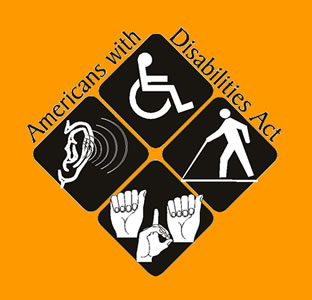
ADA LIST OF DISABILITIES TO QUALIFY FOR A SERVICE DOG
Do You Qualify As Having a Disability?
THE ADA LIST OF DISABILITIES defines “disability” very broadly and does not limit the type of disability for which a service animal can be used. In addition, there is great flexibility with respect to the nature and severity of a person’s physical, mental, or emotional issue (disability). The essence of the law states that if you have any condition that makes it difficult to perform or limits an important life activity (that other people can perform easily), you are qualified. You are not required to have a doctor’s excuse or formal diagnosis. The life activity might only be a problem during certain times, like dizziness (leading to balance problems), low blood sugar, a seizure, panic attacks, stress, or depression, to name a few examples.
Although we do not encourage exaggerating problems to qualify as disabled, it is clear that you don’t have to be blind or deaf to have a disability. Are you diabetic? Then you probably qualify if your blood sugar level sometimes incapacitates you or makes normal functions difficult. Do you have dizziness or balance problems on occasion? How about difficulty hearing?
Click to read the actual ADA definitions.
[btnsx id=”178″]
Partial List of Qualified Disabilities:
Physical Problem
- Asthma (or other breathing problems)
- Blindness (& partial blindness)
- Deafness (& partial deafness)
- Diabetes
- Dizziness/Balance problems
- Epilepsy
- General Hearing Difficulty
- Mobility Problems
- Neurological Problems
- Paralysis
- Physical Weakness
- Speech Problems
- Seizures
Emotional/Mental Problem
- Age-Related Cognitive Decline
- Any Psychiatric Condition (see exclusions below)
- Autism
- Depression
- Dyslexia
- Bipolar Disorder
- Emotionally Overwhelmed
- Panic Attacks
- Post Traumatic Stress Disorder (PTSD)
- Separation Anxiety
- Social Phobia
- Stress Problems
ADA Definitions of Qualified Disability
Under the ADA, an individual with a disability is a person who:
- Has a physical or mental impairment that substantially limits one or more major life activities;
- Has a record of such an impairment; or
- Is regarded as having such an impairment.
A physical impairment is defined by the ADA as:
Any physiological disorder or condition, cosmetic disfigurement, or anatomical loss affecting one or more of the following body systems: neurological, musculoskeletal, special sense organs, respiratory (including speech organs), cardiovascular, reproductive, digestive, genitourinary, hemic and lymphatic, skin, and endocrine.
A mental impairment is defined by the ADA as:
Any mental or psychological disorder, such as mental retardation, organic brain syndrome, emotional or mental illness, and specific learning disabilities.
NOTE: The ADA does not list all conditions or diseases that make up physical, mental, and emotional impairments, because it would be impossible to provide a comprehensive list given the variety of possible impairments.
Exclusions to the Qualified Disability Definition
Neither deviant behavior (e.g., political, religious, or sexual) nor conflicts that are primarily between the individual and society are mental disorders unless the deviance or conflict is a symptom of a dysfunction in the individual. According to Title II of the American with Disabilities Act of 1990, current or future interpretation of psychological disabilities excludes common personality traits such as poor judgment or a quick temper.
Click here to register your SERVICE DOG with the United States Animal Registrar Service Dog Registry
[btnsx id=”178″]
